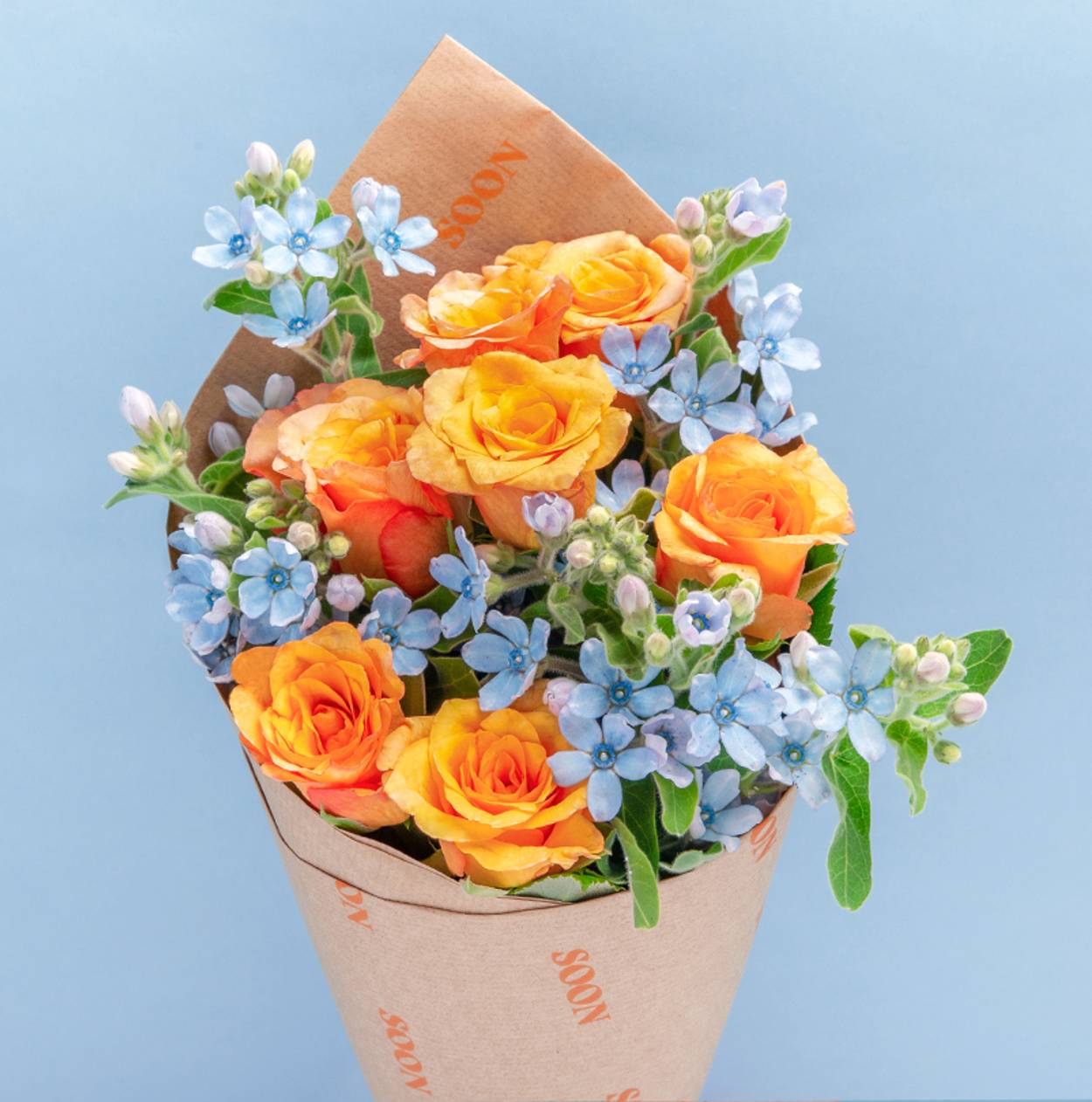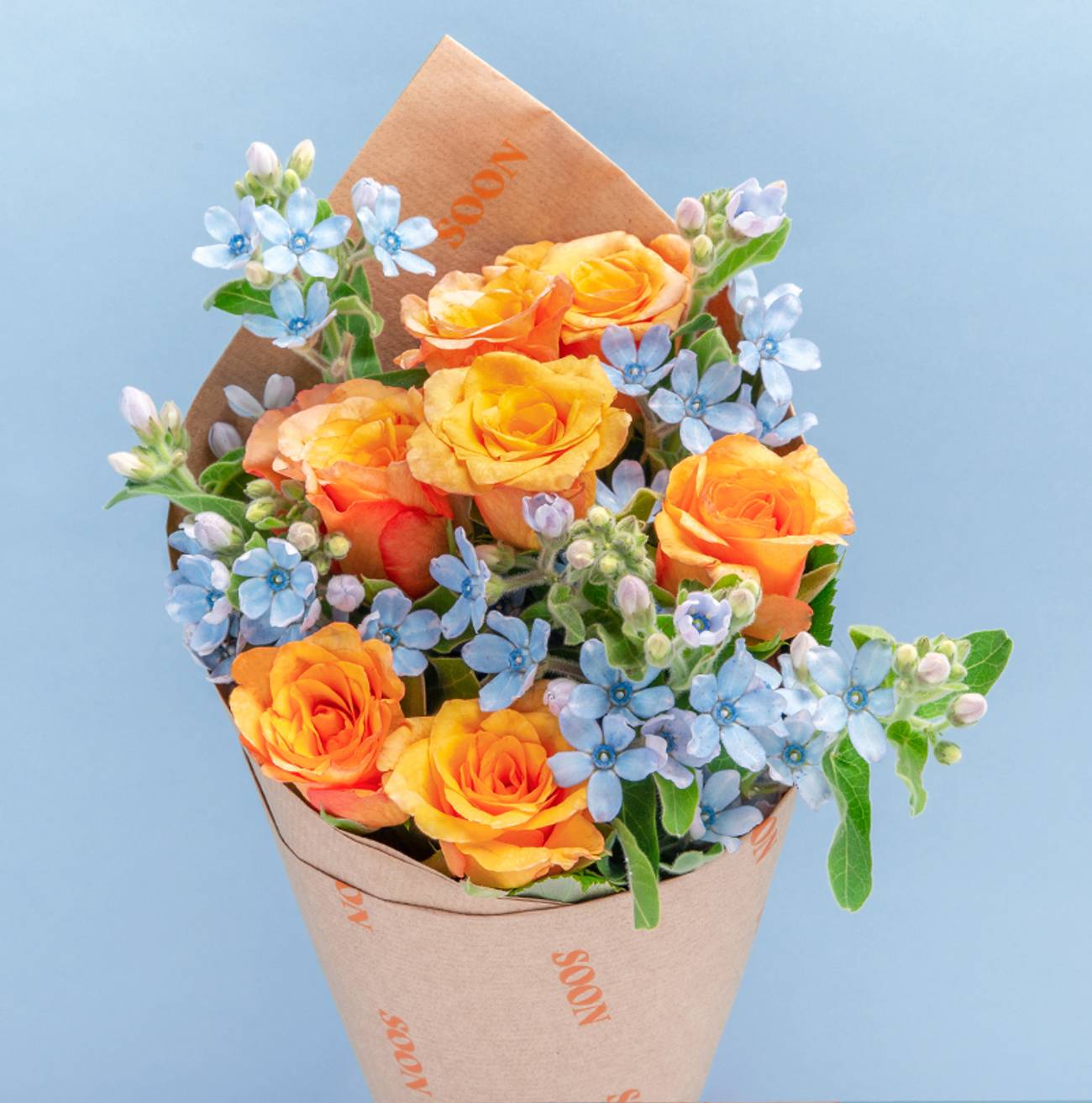Petal Pushers
The pandemic took a huge toll on traditional flower shops in Israel, but innovative businesses have found new ways to sell




Israeli businesses have taken a beating during the COVID-19 pandemic, and the flower business has been hit particularly hard, with sales down 70%. The first blow struck traditional flower shops and event planners, when large gatherings like bar mitzvahs and weddings were canceled. The second blow came when the international markets closed.
According to Haim Haddad, CEO of the Israeli Flower Growers’ Association, Israeli flower growers produce about 700 million flowers a year, but only 150 million of those are meant to be sold in the country. The rest is for export; the Negev desert’s sunny winters and other climate nuances make Israel a desirable flower producer, with flowers that European countries and Asia would be hard pressed to find. But with commercial flights suspended, COVID-19 shut most of this activity down. “Since we pick the flowers December to May, the pandemic caught us with the fields full, and the event venues and flower shops empty,” Haddad said.
But while revenue is still down, the flower business has started showing new signs of life recently, as a new generation of entrepreneurs have changed the way flowers are sold in Israel.
“COVID-19 had caused an interesting phenomenon” among young business owners—many of them children of flower growers and sellers, said Haddad, who’s been at the job for 15 years. “The younger generation had seen its parents struggle with flower sales and jumped on board, starting to market on social media and direct to consumers.”
According to Haddad, since sheltering in place began in Israel in March, flower deliveries have increased significantly, and the children of flower growers—who lost their regular jobs, like waitressing and bartending—found a new niche connected to their family farms. “Young people have started WhatsApp groups, and applied their marketing skills to help their families,” he said.
In Israel, the flower business is currently enjoying a moment of reinvention and creativity: Unique new spaces that go beyond the traditional neighborhood flower shop have started opening, getting a boost from young, inventive minds. Thanks to social media, and Instagram in particular, flowers and florists had already become a true lifestyle staple worldwide; now, Israel is catching up.
Flower-centric Instagram accounts and businesses that combine flowers with a deli, following an international trend, have been popping up in Israel lately, in small moshavim and kibbutzim. But with tech-savvy farming newcomers on one end, and entrepreneurial city folk on the other, in the past few months Tel Aviv has seen a particular flower renaissance. From a product once synonymous with weddings and big events, flowers are evolving, in locals’ eyes, into a welcome addition to the home. Since lavish bar mitzvahs, big weddings, and all major events have been forbidden, and holiday gatherings such as Passover limited to only the immediate family, flowers have become a way to both communicate with loved ones through deliveries, and to add some affordable beauty to an otherwise bleak reality.
When a friend offered Ori Haziza, CEO of a creative agency in Tel Aviv, a temporarily free space in a historic building downtown, he already had a plan. For six years, Haziza and Eliana Golomb, his partner at Avira TLV—an agency known for swanky social media campaigns and clever photography—had dreamed about creating a new type of flower business in the city. The COVID-19 pandemic, strangely, offered them the perfect opportunity to finally give it a go. In May, the two added Avira employee Hilla Marcelle Kook as a partner, and under the brand name Soon Flowers, an industrial, bewitching space in the middle of the city’s nightlife district filled up with fresh stems. Online, Haziza partnered with Wolt, Israel’s newest and slickest food delivery app, to deliver artfully arranged bouquets to homes and businesses, and opened an online flower store in addition. Business is booming—and blooming.
Soon Flowers is not alone. Merav Ben Lulu, a photographer, and Ran Golan, a designer, found themselves in the flower business in March. First, they sold flowers directly from Ben Lulu’s apartment, adjacent to the Carmel Market, then held a flower pop-up in the lobby of a now-empty boutique hotel in downtown Tel Aviv. The pop-up then moved next door to its own space. Netto Flowers isn’t your average flower shop; following in the footsteps of hybrid spaces such as San Francisco’s Marigold and New York City’s Remi Flower and Coffee, the Netto space’s centerpiece is a vintage dining table, around which Ben Lulu and Golan host first-come, first-served dinners and wine and cheese nights. One of the participants was Assaf Granit, one of Israel’s superstar chefs. The flower arrangements are inspired by Golan’s sculpture background and Ben Lulu’s vision as a lifestyle photographer. “We didn’t just open a flower shop, there’s a whole concept, with a special atmosphere and style,” Ben Lulu said. Their customers came from Instagram, and through word of mouth, and Netto became a regular spot on everyone’s weekend prep circuit.
“During the pandemic, it was sad to see all the flower shops closed,” she said. “We felt there was a need for flowers. Passover night really boosted sales.” To make Netto happen, the two approached growers and distributors all over the country, who at first didn’t understand what they were about, but were ecstatic to get some business. The generational gap played a role in their favor, Ben Lulu admitted: “We followed social media posts of children of growers, and made connections that way.”
In Soon’s case, Haziza said, there’s a weekly “dig” through Instagram posts and Facebook groups to find growers who are having a hard time selling their flowers, in order to buy off their stock when possible. “The next step is just driving to the growers and putting the flowers up for sale at a sane price,” he said. “Flowers aren’t supposed to be a luxury, and during COVID-19 more people started connecting to nature and paused to appreciate it.” A few new uses Israeli customers have discovered, Haziza said, include incorporating flowers in weekend dinners and supplementing their Zoom meeting backgrounds with something floral and mood-lifting.
A few blocks away, clothing designer Aviva Zilberman, who was always “into flowers,” partially closed her store to foot traffic and amped up its part-time function as a flower studio. She, too, treats flower arrangements as an extension of her design work; delicate arrangements can be delivered with a courier, alongside Zilberman’s clothes. “Flowers are not a trend, they’re a code word for making someone happy, for feeling at home,” she said. “But perhaps during the pandemic, people, being closed at home, wanted to have some nature inside.”
While Israelis are rediscovering flowers through these new businesses in the era of COVID-19, and traditional flower shops came back in April when a directive to reopen all street-facing businesses was implemented, all of that might not help the business at large. While Haddad reports a buzz and positive uptake in the private sector, he estimates the damage to Israeli flower agriculture at about 100 million shekels, about a third of the field’s average profit in a calendar year. The Flower Growers’ Association, which represents about 85% of the growers in Israel, had been negotiating compensation with the government; so far, 30 million shekels (approximately $8.7 million) have been allocated, but Haddad says it’s not enough. “The next step is negotiating emergency funds for the bigger growers, since they were affected the most,” he said, “as well as securing loans.” Without reopening international trade, the field is in serious danger, Haddad said: “The Israeli market alone is too little to absorb all the flowers that are grown.”
While projections are anything but rosy, the new generation of petal pushers is doing its best. “Israelis are catching on to the potential of flowers, to their ability to uplift affordably,” Ben Lulu said. “Do you know how many flowers we sent to grandmas in quarantine? I wanted to cry every time I wrote a greeting card.”
Zilberman offers an optimistic insight: “Israel has such beautiful flowers in a very high quality,” she said, “and now that they’re stuck here, perhaps we locals can enjoy them.”
Flora Tsapovsky is a San Francisco-based food and culture writer.